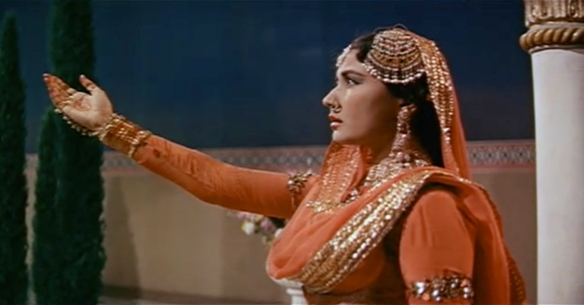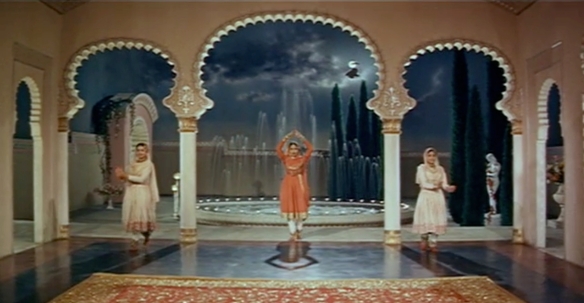Today we showcase the lyrics and English translation to the soulful “Chhupa Lo Yun Dil Mein” from Mamta (1966). One of Majrooh Sultanpuri’s greatest pieces, the calming lyrics set the tone for both the song’s music and its picturization, entering the film as fluidly as it ebbs away, as if an extension of the dialogue the audience so yearns to hear. “Chhupa Lo Yun Dil Mein” is an expression of unwavering romantic devotion set to a soothingly monastic pace.
Suchitra Sen and Ashok Kumar play two lovers who were unable to wed because of class differences, but never forget their love for one another. Suchitra later marries an abusive husband, and ultimately is forced into becoming a courtesan to survive. She tearfully gives up her only daughter so that her child can escape her mother’s ignominious shadow. In the aftermath, “Chhupa Lo Yun Dil” is not lipsynced, but rather the female voice is picturized on a lingering image of Suchitra Sen fading behind a drawn curtain, while the male is picturized on Ashok Kumar shrouding his eyes behind a pair of sunglasses. Poetically fitting, both literally conceal themselves from the viewer in a song dedicated to the beauty of hidden worship.
Roshan’s soundtrack of Mamta is as gorgeous as it is diverse (see our earlier translation of “Rahe Na Rahe Hum“). “Chhupa Lo Yun Dil” employs a rare paucity of musical instrumentation: from the opening chimes of temple manjira to the traditional bansuri echoing alone in the empty cinematic space, the song emphasizes the ascetic nature of their devotion. To match, the romantic lyrics are infused with religious imagery, and director Asit Sen carefully constructs shots that instead of bring the hero and heroine closer together, in fact emphasize their distance (even their eyelines don’t match!). Indeed, perhaps the song is not two lovers singing to each other after all. The song can be read instead as a mother singing to the daughter she will leave forever, and a father discovering a new meaning to his life by caring for the child in her mother’s memory.
Based in Bollywood’s favorite raaga Yaman, “Chhupa Lo Yun Dil” is one of the most moving Hemant Kumar-Lata Mangeshkar duets of all time. We hope you enjoy our English translation to the lyrics of “Chhupa Lo Yun Dil Mein” below!
Chhupa Lo Yun Dil Mein Lyrics and Translation:
MALE:
Chhupaa lo yuu.N dil mei.N pyaar meraa
Hide my love inside your heart
Ki jaise mandir mei.N lau diye kii
Like the flame of a candle inside a temple
FEMALE:
Tum apne charano.N mei.N rakh lo mujhko
Keep me by your feet
Tumhaare charano.n ka phuul huu.N mai.N
For I am the flowers beneath your footsteps
Mai.N sar jhukaaye khaDii hoo.n priitam
I am standing with my head bowed, my beloved one
Ki jaise mandir mei.N lau diye kii
Like the flame of a candle inside a temple
MALE:
Yeh sach hai jeenaa thaa paap tum bin
It is true that to live without you was a sin
Yeh paap mai.N ne kiyaa hai ab tak
I have committed this sin until now
Magar thii man mei.N chhabii tumhaariI
But your image was always in my mind
Ki jaise mandir mei.N lau diye kii
Like the flame of a candle inside a temple
FEMALE:
Phir aag birhaa ki mat lagaanaa
Please do not light the fire of separation again,
Ki jal ke mai.N raakh ho chukii hoo.N
For I have already burned into ashes
MALE:
Yeh raakh maaThe pe mai.N ne rakh lii
I have worn those ashes upon my forehead
Ki jaise mandir mei.N lau diye kii
Like the flame of a candle inside a temple
BOTH:
Chhupaa lo yuu.N dil mei.N pyaar meraa
Hide my love inside your heart
Ki jaise mandir mei.N lau diye kii
Like the flame of a candle inside a temple
Glossary:
chhupaanaa: to hide; mandir: temple; lau: flame; diyaa: candle; charan: footsteps; phuul: flower; sar jhukaanaa: to bow [one’s] head; khaDaa: standing; priitam: loved one; jiinaa: to live; paap: sin; man: mind; chhabii: image; aag: fire; birhaa: separation; jalna: to burn; raakh: ashes; maaThe: forehead

Suchitra Sen’s glittery teal eyeshadow brilliantly matches her sari before becoming soaked in tears in Mamta (1966).
Famous Bengali director Asit Sen was well-known for making films with a refreshingly strong female lead, from Khamoshi (1969) starring Waheeda Rehman to Safar (1970) starring Sharmila Tagore. His mentor was none other than auteur Bimal Roy of Parineeta (1953) fame, which undoubtedly influenced the stories he chose to tell in his own directorial works. This beautiful Mamta song was requested by fan Jiyati Verma! Thank you for the great request!
– Mrs. 55










